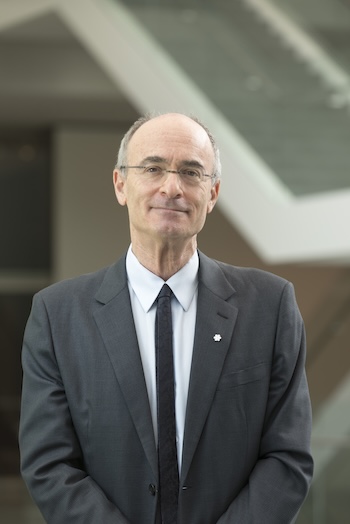By Robert Israel
“The MFA is a place that really matters to a lot of people, and it is the safety of this place that matters and its commitment to excellence. These are things that must never be compromised.”
Matthew Teitelbaum, appointed Gund Director of the Museum of Fine Arts, Boston (MFA) ten years ago, has brought considerable change to the 155-year-old, renowned Boston arts institution. He will retire on June 30. A 69-year-old Canadian citizen, he plans to divide his time between Toronto and Boston. After an international search, Pierre Terjanian, MFA’s Chief of Curatorial Affairs and Conservation, has been named his successor and will become the MFA’s 12th director on July 1.”
Art Fuse interviewed Teitelbaum in May at the museum’s Taste Café, asking him to reflect on his decade-long service as MFA director.
Arts Fuse: At your first press conference I attended a decade ago, and with less than 100 days on the job, you told the press you were an agent of change. The MFA had a reputation as an imposing, inaccessible place. You projected a photographic image of the MFA building at night, saying, ‘Here’s a view of your MFA at night. I have to figure out a way to keep the MFA lively after dark.’

Matthew Teitelbaum, Ann and Graham Gund Director at the Museum of Fine Arts, Boston. Photo: Museum of Fine Arts, Boston.
Matthew Teitelbaum: Whenever you take a new position, you have a mandate to bring change. But I strongly believe in evolution, not revolution. Change comes incrementally. So, yes, we did find ways to keep the MFA not quiet at night. We introduced more programming and events. We moved the MFA forward with an agenda to make change happen strategically. Since change cannot happen by itself, the MFA’s staff moved things forward because it takes a staff working together to make things happen.
AF: At that early press conference, you emphasized ‘your’ when speaking about the MFA. From the outset, you envisioned the MFA as a more welcoming and inclusive place, yet the museum was not widely seen that way. Interestingly, no one mentioned the MFA staff as key to implementing this change.
Teitelbaum: That’s because I embrace, from the Jewish liturgy, this belief: ‘We look upon others as we have them look upon us…we grant to every person the rights we claim for ourselves.’
AF: That said, during your watch, the MFA faced an accusation of racial discrimination. In 2019, an incident occurred in which Black middle school students from Dorchester, on a field trip, reported being mistreated.
Teitelbaum: A strategy was already in place to make the MFA more welcoming before that incident took place. We already had this in a strategic plan. We were working to implement it, on transforming the MFA so that an incident like that wouldn’t occur. We were on that journey when it happened. It was a moment when many behaviors came together. What I did was to focus on my values, and to look at it from all sides, to have empathy for the students, the guards, and the staff. I also knew I did not have to resolve the problem in 24 hours, despite the intense urgency and the intense pain I felt to make change happen.
AF: There was significant public pressure from Attorney General and Gov. Maura Healey, along with increased scrutiny by the media.
Teitelbaum: And we arrived at change together. You see it written on the wall just down that corridor – “Here All Belong.” We make that happen every day. That’s what leadership is all about. It’s about making decisions at the right time. It’s about making decisions you can sustain. When you’ve been a director over 10 years as I have been, and you’ve hired a number of people who are talented, and you’ve trained them, and you’ve promoted them, and you trust them to make decisions. But you must not make decisions too early, or, for that matter, too late. The MFA is a place that really matters to a lot of people, and it is the safety of this place that matters and its commitment to excellence. These are things that must never be compromised.
AF: That echoes your earlier statement about “your MFA” — creating a sense of community that was not as strong at the MFA before your tenure.
Teitelbaum: You have to meet the moment. You have to ask the question and then define, ‘What is community?’ At the MFA, it’s a place where art and people meet. It’s about preserving that sense of excellence. It’s about coming together in a real space. It’s about being a catalyst and being adventurous.
AF: Since you champion solidarity, how do you think the community will reflect on your tenure at the MFA?
Teitelbaum I would hope they will say that I helped to open the arms of the MFA to become a more welcoming place without sacrificing a milliliter of excellence. That I’ve helped them to think about the MFA as a place to confront ideas beyond traditional categories. That I’ve helped to put together a great team who work to make these things happen.
AF: What will you miss most about being MFA director?
Teitelbaum: Watching people think. When you watch people think, you see people change.
Robert Israel, a contributing Arts Fuse writer since 2013, can be reached at [email protected].